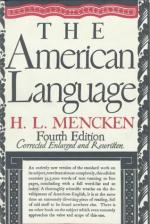|
This section contains 233 words (approx. 1 page at 400 words per page) |

|
Chapter 8.3 Summary
Mencken announces that the superiority of American spelling is due to its rapid advancements despite English objections. English purists who refuse to take English lessons from overseas, he writes, root such opposition, in an "esthetic hatred." Later, however, the English would take on what they knew were "Americanisms." They adopted tendencies to drop silent letters, forego redundancies, and replace certain forms with others. The word-changes instituted by Noah Webster were now English word-changes introduced by America. The scholars in Great Britain, then, had only one more concern, he says, to agree on which spellings to adopt and which to dispense with.
Chapter 8.3 Analysis
American spelling remained superior, says Mencken, by advancing in spite of the extreme opposition in Britain. He maintains their protest was not because of academic or etymological objection but because English purists were appalled by America, American English, and English...
(read more from the Chapter 8.3 Summary)
|
This section contains 233 words (approx. 1 page at 400 words per page) |

|




